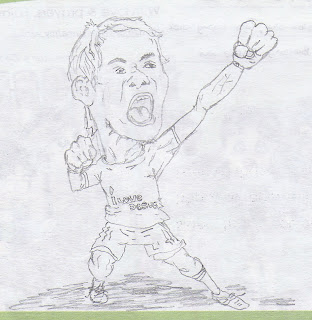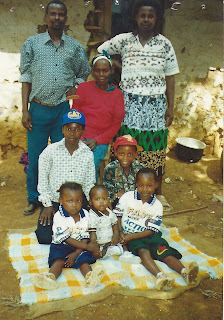Poverty and homelessness is no joke, and it can affect anyone, anywhere, at any time. I found this out first hand.
| {source} |
During my second year of college, I came very close to being homeless. I was estranged from my parents, I had no job, and the left overs from my student financial aid package only stretched so far. On the outside, I was a success - honor roll, Team Coordinator of a student leadership group, musician, and writer. Behind the scenes, I had to choose between paying my half of the rent or buying groceries. I choose to keep a roof over my head, and went hungry for three days before an unusual and humbling opportunity presented itself.
The student leadership group that I led had to participate in a leadership training program each term; that particular term, the focus of the program was on poverty and homelessness. Living near Portland, Oregon, we had lots of opportunities to reach out to those in need in our communities, and on my fourth day without food, we spent the evening volunteering in a local soup kitchen. It was agonizing, serving plate after plate heaped high with hot food, but I was too proud to ask for a plate myself (because I was not homeless, I could not simply come as a client). I pasted on a smile, and sincerely tried to focus on the good we were doing, and how thankful the people were that we served.
During clean up, I was shocked - because of state health code and non-profit regulations, all of the left over food had to be dumped in the trash. I lost it! Lightheaded and nauseous from lack of food, I tossed aside my pride and quietly asked the person in charge of the kitchen if I could have a plate to take home with me, as I would not have money for groceries for another three days. I had hoped that my request would escape the notice of the other students in our group, but to my dismay the woman reiterated my question in a loud voice, "You want to take home some of these left overs?" Every eye in the group locked on my flaming face. I squared my shoulders, took a deep breath, and confirmed my request. She stared at me like I was crazy, and I added that I had not eaten in four days. At those words, the room began to buzz with shock and whispers, but the woman didn't hesitate, and dished up enough left overs to last me through the three days until my money came in and I could go to the grocery store. None of my classmates ever spoke to me about it, preferring instead to pity me from a distance. I can't say I would have enjoyed a conversation with any of them about my circumstances, but it revealed to me a fundamental attitude of shame that surrounds the issue of poverty, and I affected me profoundly - this is not how we should look at people in need.
Several years later, I experienced another facet of poverty - homelessness.
My husband and I had been married for almost a year when the economic crash caught up with us in Montana. Due to a medical condition, I was already unable to work, and the only job Nick was able to find was ten hours a week at minimum wage in retail. Unable to do more than put food in our mouths and gas in our car, we lost our apartment. Thanks to the generosity of friends and family, we never spent a night on the streets, but we spent all but seven months of the next four years living in guestrooms, and at one point a garage (there was no room in the house). As of March 6th, 2012 - only a short week prior to writing this - we were finally able to rent our own apartment again, and I am so grateful! I will never ever take having a home of my own for granted, and I am relieved beyond measure that we were able to regain our independence when we did - our first baby will be entering the world by the end of April.
Without the kindness and hospitality of friends and family over the last four years, my husband and I would have been living on the streets. First in Montana, later in Wyoming, and now in Illinois...I shudder to think how we would have fared during the winter in any of those places. I owe a debt of gratitude that I can never repay to so many people.
During our time as displaced adults, we learned a few things about the attitudes and ideas that prevail in our society toward the homeless. There is a terribly tendency to lump all those without homes into the same camp - lazy, shiftless, criminal and entitled. Like any stereotype, there are those who fit the cliche, but it is horribly unfair and inaccurate to stamp everyone in a group with the same labels. There are a staggering number of people just like my husband and me who become homeless, not because they are unwilling to work or to support themselves and their families, but because there is no work, or in many cases, not enough work. With the only exceptions being when he was injured on a job (which he lost as a result - another factor beyond anyone's control), and for the first 10 months after moving to Illinois where jobs can be found but where hundreds compete for each one, Nick has worked steadily at one job or another for as long as I have known him. But when the money you make is not enough to put a roof over your head and food in your belly, there isn't much you can do.
Poverty affects millions the world over, and it can be found as near as your next door neighbor - and sometimes, as near as your living room. Homelessness can be as near as your next paycheck, or lack of one, and it is no respecter of education, class, or nationality. Whether a young girl on the streets in Sri Lanka, or a middle aged man in a shelter in Minneapolis, the homeless are among us, and more often than not, they would do anything to change that. Rather than sitting safe in our homes, comforted by our perceived superiority and financial security, we need to recognize the needs around us and act in whatever way we are able to help relieve the terrible burden of poverty, and help those in need rise above their circumstances so that they too may participate in the world without fear, and without wondering where they will sleep tonight.






